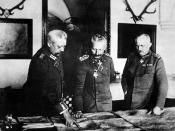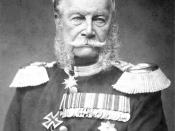The period from 1815-1914 is often referred to as the "Hundred Years' Peace," or "Pax Britannica." From the end of the Napoleonic Wars at Waterloo in 1815 until the outbreak of war in 1914, Europe found itself relatively at peace. Compared with the long series of wars that had preceded 1815 and the carnage of the 20th century, it is not an unfair assessment. Beginning around 1870, however, events began to evolve in ways that threatened the long-standing peace, and a long slide toward eventual conflict began, though it was far from apparent at the time. Indeed, following the wars of German unification of the 1860s and the Prussian defeat of France in 1870-71, the rise of the remarkable statesman, Prince Otto von Bismarck of Prussia, seemed to promise a period of, if not permanent, then certainly long-lasting peace. Through wily manipulation of power (what he called Realpolitik) and skillful diplomacy, Bismarck created an alliance system that, although built on a condition of international tension, was nevertheless quite stable.
Through a series of treaties, conferences and diplomatic exchanges, most of which were conducted under varying degrees of secrecy, Bismarck carefully built his structure, knowing all the while that underneath it was fragile and indeed might well be upset someday. (He predicted that if and when it fell apart it would be due to "some damned foolishness in the Balkans," and in fact he was right, though the "damned foolishness, an assassination," happened some 20 years after his death.)
Part of the problems for Bismarck and the statesmen who followed him was that industry had begun to revolutionize the World by 1871. Following the American Civil war, with new weapons and techniques, it was clear that railroads, steamships, and other industrial advances were going to reshape not only war but defense...


